横浜国立大学先端科学高等研究院・シンポジウムシリーズ 「社会インフラストラクチャの安全研究ユニット」サマースクール 17th July 4th August, 2017 at Yokohama National University

APESS Welcome message
It is our pleasure to invite you to attend the 2017 Asia-Pacific-Euro Summer School on Smart Structures Technology (APESS) that will be held from July 17th to August 4th 2017 at Yokohama National University. The summer school is organized under auspices of the Asian-Pacific Network of Centers for Research in Smart Structures Technology (ANCRiSST).
Participants of the APESS will attend three-week lectures given by experts in civil engineering, structural dynamics and control, smart structures technology, and structural health monitoring. They will also participate in technical visit and laboratory projects where they will learn about fundamental and practical use of sensing principles and technologies for infrastructure monitoring.
The APESS program aims at providing participants with international oriented program that recognizes both the achievements in smart structures technology of participating nations as well as a common desire to pioneer a structured educational framework. Through this program, participants will be exposed to leaders in the field, both domestic and international.
We would like to acknowledge the supports from Asian-Pacific Network of Centers for Research in Smart Structures Technology (ANCRiSST), Japan Society for the Promotion of Science (JSPS) 157th Committee on Structural Response Control, Japan Science and Technology Agency for through the Sakura Science Program, and Institute of Advanced Sciences (IAS) of Yokohama National University.
Welcome to Yokohama. We are delighted to have you as the participant and wish you to have a good and fruitful time at the 2017 APESS.

Please find important information for your preparation before leaving for Yokohama:
Mission: Smart Structure Technologies and the Role of APESS
Advanced sensor technology improves the accuracy of measurements and provide more opportunity for more detail structural evaluation. Their application in the modern world is increasingly widespread. Structures instrumented with sensors can communicate their current condition to a data acquisition system in the form of accelerations, displacements, strains, etc., depending on the sensor type. This information can be used in real-time to control and evaluate structure performance during severe earthquake or wind loads or assess the health of a structure after such events. In the long term, sensors can be used to evaluate structure degradation and to plan maintenance or retrofit works. Instrumentation of full scale structures is a daunting task involving a push for improved technology and understanding in areas of structural dynamics, control systems, circuit technology, wireless technology, and informatics, to name a few. In summary, smart structure technologies offer new opportunities and challenges to the way civil infrastructure systems are monitored, controlled, and maintained.
Conventional civil engineering curriculum only exposes students to the range of the contributing disciplines to smart structures technology in a limited fashion. The APESS program aims at bridging the gap that divides these disciplines through a student oriented international summer program. Graduate students and young researchers each from Japan, China, Korea, the USA and European Countries will get together for three weeks of focused activities related to smart structures technology. The curriculum will be oriented to address any gaps in education which are necessary for the advancement of the field.
The 2017 APESS will be the tenth edition of the summer school, with the first edition held in 2008 in KAIST South Korea and the last edition held in Cambridge University UK in 2016. Other previous hosts of the APESS include the Univ. of Illinois at Urbana-Champaign (UIUC) US, Univ. of Tokyo Japan, Tongji University China, Indian Institute of Science India, and the National Taiwan Univ. ENCREE Taiwan.
The Programme
Please find all information about lectures, technical visits and other activities on:
Summer school program consists of lectures given by experts in the following subjects : Advanced structure engineering and dynamics.
- Advanced structure dynamics.
- Research and development in long-span bridges
- Research and Practice in Steel Structure.
- Hybrid Simulation Testing.
- Finite Element Model Updating, Validation and Verification.
- Wind Engineering and Earthquake Engineering
Structural Control and Applications
- Structural Control Theory
- System Identification Theory and Application
- Application of control technologies to buildings and bridges.
Smart Structures Technology, Sensing and Materials
- Data Acquisition for structural monitoring
- Wireless Sensors and Fiber-Optic Sensors
- Development of Smart Sensing Technologies and materials for NDT
- Application of Robots Technology.
Structural Health Monitoring and Assessments
- Structural damage detection
- Applied system identification for structural assessment
- Data analysis via machine learning
- Sparsity and environment issues in SHM
- Experiences and Practices of SHM for buildings and bridges
- Serviceability and lifetime assessment of structures
In addition to the lectures, students will participate in:
- Laboratory projects on the use of sensing principles and technologies for monitoring infrastructure.
- Free attendance to ANCRiSST Conference (22-23 July at Univ. of Tokyo)
- Technical visit to structures with control application and new constructions on July 24, 2017.
- Exciting cultural events around Tokyo and Yokohama cities.
Lecture Notes and Material
Please find all lecture notes and materials on:
Lecturers
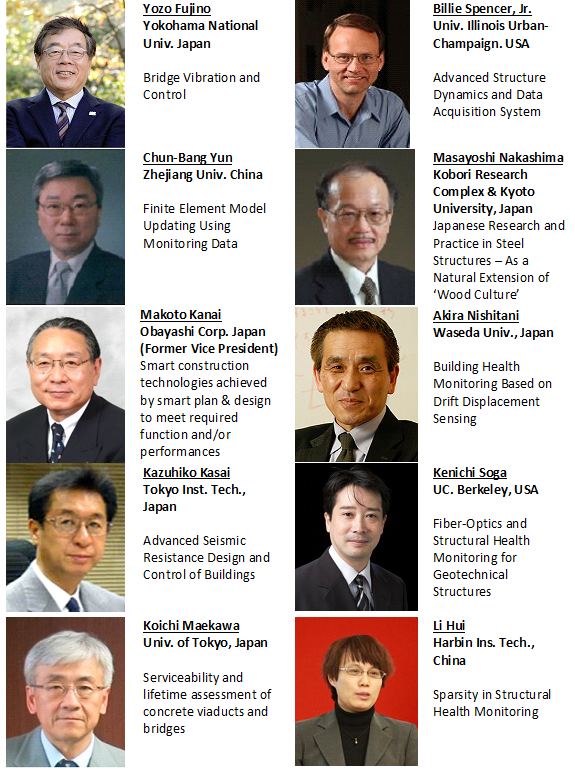
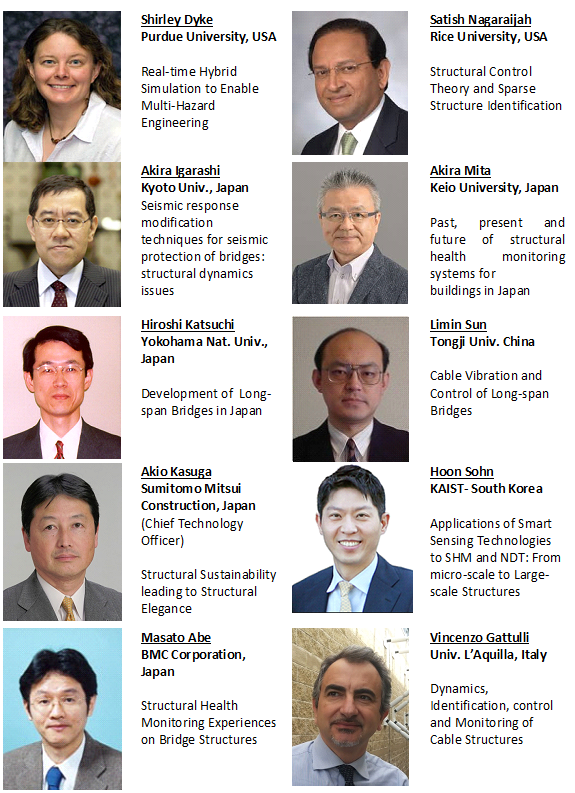
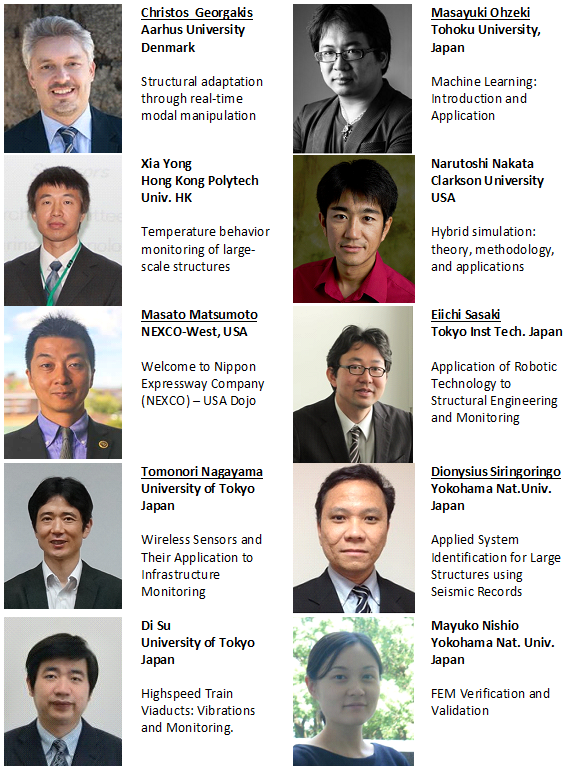
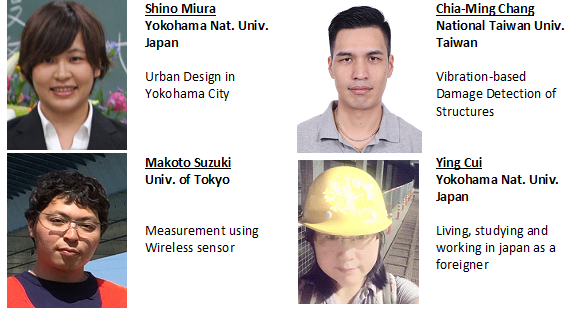
Technical Visits
Organizer has arranged three technical visits for APESS participants:
Technical visit to Japan's first ultra-large vibration control device - tuned mass damper (TMD) (approx. 1,800 tons) on the roof of the Shinjuku Mitsui Building. The TMD is designed to significantly reduce shaking caused by long-period earthquake ground motion. Kajima Corporation began installing the device from mid-August 2013, aiming to ease the concerns of office workers by keeping the magnitude of building motion within the range of the most state-of-the-art skyscraper. This ultra-large TMD vibration control device represents the further development and application of the pendulum-mass system that is conventionally used to control the wind-induced motion of skyscrapers. Participants will visit the building and TMD device and have technical discussion about the system.
Kajima Technical Research Institute was established as the construction industry's first technical research institute in Japan in 1949. The institute has developed modern technologies for a wide range of fields, including those used in the construction of skyscrapers, bridges, seismic devices and vibration controls. Participants will visit the research institute and have technical discussion about the research and development.
- Demonstration and Trials of Method and Practice of Bridge Inspection in Yokohama Area
Participants will visit some regular bridges in Yokohama area that have deteriorations problem. In this technical visit participant will have experience on bridge inspection, learn about typical deteriorations on the structures and have technical discussion about inspection and monitoring technologies to solve the problem.
APESS Schedule
The APESS will start on July 17, 2017 morning with opening lecture and opening ceremony and end on Aug 4, 2017. Please find the detail schedule :

Contact
For detail information and inquiry please contact : Dr. Dionysius Siringoringo (dion@ynu.ac.jp), Dr. Mayuko Nishio (nishio@ynu.ac.jp) and apess2017-ias@ynu.ac.jp
The Host: Yokohama National University (YNU)
- Founded in 1949, one of public universities in Japan
- Five graduate schools (Engineering, Environment and Information Science, Urban Innovation, Education, and International Social Science)
- Four undergraduate colleges (Engineering Science, Education and Human Science, Economics, and Business Administration)
- Over 600 faculty members, 7,400 undergraduate students, 2,400 graduate (460 of them are international students).
For further information, please visit website (http://www.ynu.ac.jp/english/index.html)
How to reach Yokohama National University
http://www.ynu.ac.jp/english/access/index.html

Accommodation
Accommodation during three-weeks stay at Yokohama is prepared for all participants. Three residences with easy access to campus, as well as the Yokohama city center, are provided to ensure a convenient stay. The cost will be in the range of 2,800-7,800 yen per night, depending on the type of rooms. The cost of accommodation is not included in the registration fee. For detail information about accommodation please refer to
https://form.jotform.me/apess2017/hotel_accommodation
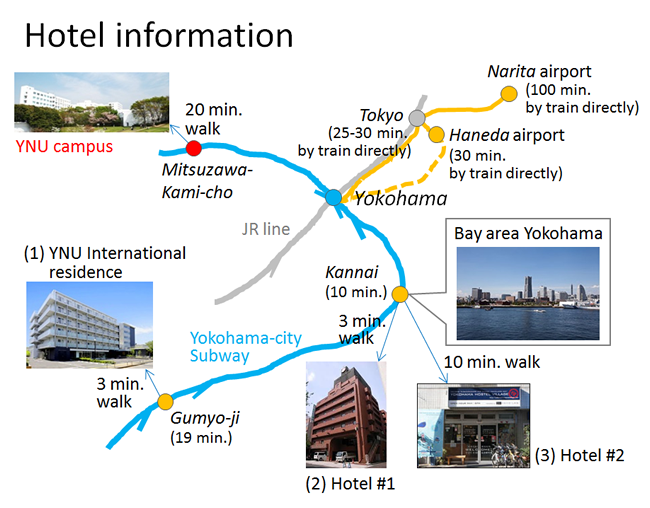
The city
Yokohama is a vibrant port city located 30 minutes by train to the south of Tokyo. It is the capital of Kanagawa Prefecture and Japan's second largest city, with a population of over three million. Towards the end of the Edo Period (1603-1867), during which Japan maintained a policy of self-isolation, Yokohama's port was one of the first to be opened to foreign trade in 1859. Consequently, Yokohama quickly grew from a small fishing village into one of Japan's major cities. Until today, Yokohama remains popular among expats, has one of the world's largest Chinatown in Japan, and preserves some former Western residences in the Yamate district.
The Yokohama city can be accessed from major cities in Japan and from international flights to Tokyo.
For further information about city access, please refer to http://www.yokohamajapan.com/transportation/getting-to-yokohama/

